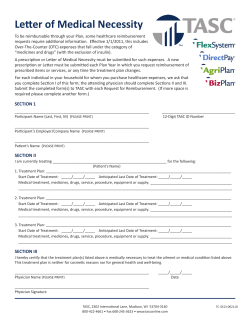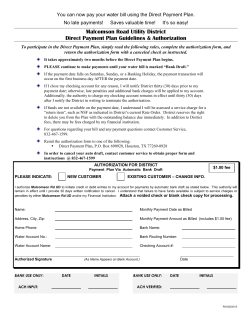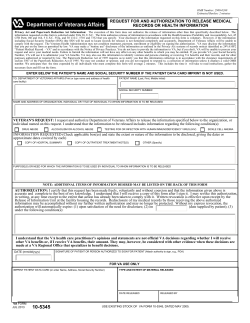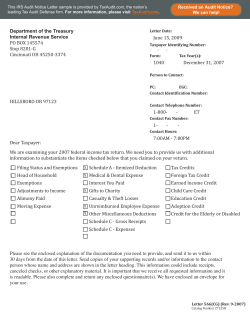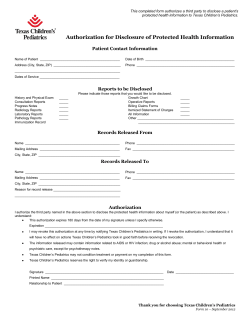
Boise State University BSU Policy # 6180 Effective Date: July 1978
Boise State University Effective Date: July 1978 BSU Policy # 6180 Revised: October 2007 TRAVEL Purpose: To establish university policy for travel procedures for employees and students traveling on university business. Additional Authority: Idaho Code §67-1001 Idaho Code §67-2004 et seq. Idaho Code §67-5250 Scope: Applies to all travel being conducted by university employees and students that involves university reimbursement or liability. Responsible Party: Travel Services, 426-1539 Definitions: Official Station—the work area or office assigned to the employee. Per Diem Expenses—reimbursement for meals, meal gratuities, and fees and tips given to porter, baggage carrier, bellhop, hotel maid, steward or stewardess on ships, and hotel servants in foreign countries. POLICY I. Policy Statement When a member of its community travels on official business, the University assumes liability as well as costs associated with that travel. Therefore, it is prudent that the university establish specific guidelines to aid its members in conducting their travel and seeking reimbursement for their university related travel expenses. II. Procedures A. Initiation of Travel Request: The faculty/staff member asking for permission to travel should submit a request to the department chair or unit head. If there are sufficient funds available to cover the travel expense in part or in full, and if the department chair or unit head approves the request, the faculty/staff member will be given authorization to complete a “Travel Request and Authorization” form. The form should then be presented to the dean or supervisor for review/approval and the final appropriate signatures. Persons traveling without prior approval will not be eligible for the university reimbursement process. B. Authorized Signatures: Necessary and appropriate travel authorization signatures are as follows: 1. Academic areas require a department chair or unit head signature, as well as a dean’s signature. 2. Academic department chairs require their dean’s signature. 3. Administrative areas require a department or unit head or director signature, as well as the relevant vice president’s signature. 4. Academic deans and administrative directors require their vice president’s signature. 5. Vice presidents require the university President’s signature. C. Travel Service Requirements: If there is no expense to be incurred by the traveler, the individual requesting permission to travel does not need to submit the “Travel Request and Authorization” form to Travel Services. Rather, the affixed appropriate signatures signify that the process is complete and the individual is documented as traveling on official University business. However, if there is an expense to be incurred by the traveler, the “Travel Request and Authorization” form must be submitted to Travel Services, who in turn will review it for approval. Should the form be complete and correct and approved, Travel Services will keep a copy for their own records and return the form to the individual requesting travel permission for completion after his/her trip. 1. Timeliness of Submission: Travel Services should receive the travel request ten to fifteen working days before the requesting individual(s) depart(s). The “Travel Request and Authorization” form must be submitted for reimbursement within sixty days of trip completion. Grants and sponsored projects paperwork for travel must be submitted within thirty days of trip completion. 2. Reimbursement for Prepaid Airfare: If the traveler wishes to apply for early reimbursement on prepaid airfare, he/she should submit the “Travel Request and Authorization” form, with Section One completed, to Travel Services. The traveler should attach the original invoice/itinerary showing a zero balance due along with a copy of the passenger receipt of the airline ticket. After the traveler returns from the trip, he/she should complete Section Two of the previously approved “Travel Request and Authorization” form and submit it, along with the original passenger receipt from the airline ticket and other original receipts, to Travel Services. For electronic ticket/online purchases, the traveler must submit an itinerary/receipt confirming the purchase. 3. Early Reimbursement and Prepaid Registration Fees: If the traveler wishes to apply for early reimbursement on prepaid registration fees, he/she should attach a copy of the registration form (showing the published amount and method of payment) to the “Travel Request and Authorization” form and submit it to Travel Services after completing Section Two of the latter form. If the method of payment was a personal check, the traveler should attach a copy of the cancelled check (back and front) or an original itemized receipt to the “Travel Request and Authorization” form. 4. Direct Vendor Pay: When a traveler wishes to apply for direct vendor pay, he/she should fill out Section One of the “Travel Request and Authorization” form, list the estimated costs, attach the invoice/registration form, obtain appropriate signatures, and submit them all to Travel Services. 5. Lost or Misplaced Forms: Lost or misplaced “Travel Request and Authorization” forms that have not been submitted with attached receipts can be replaced with Travel Expense Voucher for Reimbursement forms. “Travel Expense Voucher for Reimbursement” forms may also be used as continuation sheets for “Travel Request and Authorization” forms when more lines are needed. 6. Use of State Vehicles: If using a state vehicle from the Motor Pool, the traveler must complete a Motor Pool Reservation and Charge form. For local and vicinity travel one motor pool form can suffice for the entire fiscal year. See Boise State University Policy #6905 “Scheduling and Utilization of University Vehicles” for the appropriate procedures. University vehicles may only be operated by university employees and other individuals, such as university students (if a University department head or designated representative has granted prior approval). University vehicles may only be operated by individuals who posses a valid driver’s license. It is suggested that a copy of the traveler’s driver’s license and liability insurance card be kept on file by the authorizing department. D. Travel Advances: Travel advances are only allowed for student organization travel. A student organization may request a travel advance by submitting a “Travel Request and Authorization” form, following the procedures outlined above. The form should be submitted in the name of the group’s advisor to Travel Services. A list of the students participating in the trip must be attached to the form. Following the form’s submission, Travel Services will process the advance request and forward the document to Accounts Payable for check issuance. Checks can only be issued in the advisor’s name, and must be claimed by the advisor personally, who must sign a travel repayment agreement at the time the check is picked up. In order to clear the travel advance upon return from the trip, the student organization must complete the “Travel Expense and Authorization” form, section two. It must also obtain the appropriate signatures (if trip does not exceed 10% of the original estimated amount the form need be signed only by the traveler and the department/unit head), attach original itemized receipts, and file the “Travel Expense Authorization” form with Travel Services. 1. Travel advances can be issued for one hundred percent of the estimated expenses. No travel advance will be issued for less than one hundred fifty dollars. No advance will be issued if a previous advance is outstanding. Advances must be repaid within fifteen days after return from a trip. Travel advance requests must be submitted ten to fifteen working days prior to the anticipated trip for sufficient processing time. E. Student Field Trips: Nearby campus field trips, not involving group transportation or cost to the department, may be scheduled by the department chairperson at his/her discretion. When a department head or dean recognizes a field trip as educationally beneficial for a group of students, travel arrangements should be made according to the following procedures: 1. Request for Approval: A “Travel Request and Authorization” form must be completed and submitted for approval by the responsible faculty member to his/her department chairperson and dean at least two to three weeks in advance of the planned trip. A list of the students participating in the trip and a copy of the itinerary, including lodging arrangements, must be attached to the “Travel Request and Authorization” form. The responsible faculty member will advise students that it is their responsibility to check with their other instructors regarding class absences due to field trips. 2. Additional Authorization: After authorization from the department head/dean of the college has been obtained, the Travel Request must have signature approval from the Dean/Department Chair and the Vice President for Student Affairs (or designee). 3. Use of Private Vehicles: If private vehicles are taken on the field trip, the responsible faculty member will determine that each driver has a current driver’s license and the vehicle is insured with the minimum automobile liability insurance required by Idaho Code 49117(18), which is $25,000/$50,000/$15,000. It is suggested that a copy of the vehicle owner’s driver’s license and liability insurance card be kept on file. In addition, the General Field Trip/Event Expectations form and Field Trip/Event Informed Consent form, which includes a liability release, must be signed by the student or parent/guardian (if a minor). III. Regulations A. General: Payment of travel expenses by the State of Idaho and the University is limited to costs authorized in these regulations. If a department stipulates a maximum reimbursement, the remaining expenses will be paid by the traveler as personal expense. B. Travelers with Disabilities: With prior approval of the department head/director, employees with disabilities are allowed payments of certain additional travel expenses to accommodate their disabilities such as, but not limited to, cost of specialized transportation, increased cost of specialized services for public carriers, or special baggage handling. C. Meal Expenses: For meal expenses no receipts are required, except in instances of team travel. 1. Per Diem Reimbursements: Per diem reimbursements will be paid to the traveler in accordance with the amounts set by the Board of Examiners, up to the maximum allowed for all official travel which mandates an overnight stay. Complimentary meals, including continental breakfast provided by a hotel and meals provided by a common carrier will not be deducted from the per diem allowance paid. 2. Partial Day Reimbursement: Employees absent from their official station for less than twenty-four hours shall be paid a partial day per diem reimbursement at the maximum rate set by the Board of Examiners: breakfast at 25% of the total per diem rate, lunch at 35 % of the total per diem rate, and dinner at 55% of the total per diem rate. Partial day reimbursements without an overnight stay are considered taxable income per IRS regulations, and will be reported to the Payroll Department. For travel involving an overnight stay, a partial day reimbursement for per diem shall be paid to the traveler at the maximum rate set by the Board of Examiners within the following limitations: a. Breakfast: If the actual departure time is 7:00 a.m. or before or if the return time is 8:00 a.m. or after. b. Lunch: If the actual departure time is 11:00 a.m. or before or if the return time is 2:00 p.m. or after. c. Dinner: If the actual departure time is 5:00 p.m. or before or if the return time is 7:00 p.m. or after. 3. Meals, Incidental, and Lodging Expenses and Per Diem Reimbursements: If meals are furnished as part of a conference registration fee, the employee shall be reimbursed for meals not provided at the partial day per diem rate. When permitted by internal departments or federal grants or contracts, the amount reimbursed for the cost of meals and incidental travel expenses, such as laundry and dry cleaning, incurred on travel outside the U.S. will be based on the per diem rate published by the U.S. Department of State for travel to foreign countries. The actual cost of lodging plus applicable tax and service charge will be reimbursed to the traveler. The employee is expected to obtain the most reasonably priced lodgings available. 4. Meals at Employees Official Station: No reimbursement will be allowed for meal expense at an employee's official station, except as provided below. The department head may further define the “official station” of employees with unique work assignments or responsibilities. An exception may be made when the department head determines that due to unusual circumstances it is in the best interest of the state that the employee not return home each night, or when these expenses are prepaid as part or a registration for a conference, or when the employee’s job description requires the employee to be on call for emergencies during meal time. 5. Conference Meals: Any potential determination as to what comprises a “conference” or “convention” at the official station must meet certain criteria before any consideration of meal reimbursement will be made. Such criteria may include one or more of the following: a) the function has participants from various locations, b) a registration fee is charged, c) it has a published agenda, d) meal cost is included in the registration fee, and e) attendance is compulsory or voluntary as determined by the department director. 6. Informal Meetings: Reimbursement for meals at the home station is not allowable for informal meetings (e.g. over a casual breakfast, lunch, or dinner) between staff members of an agency or other agencies, other state and federal employees, state employees and legislators, and so forth. The State Controller's Office will interpret all meetings to be informal unless documented proof showing otherwise is submitted with the “Travel Request and Authorization” form. D. Lodging Expenses: The actual cost of lodging plus applicable tax or taxes will be reimbursed to the traveler. Original itemized receipts for all lodging must be attached to the “Travel Request and Authorization” form along with credit card charge slip, if a credit card was used to pay the balance. Lodging costs within an employee's official station are not allowable. At the time of making reservations, employees should identify themselves as State employees and ascertain whether a state rate is available. E. Mode and Route of Travel: Employees shall use the most economical and practical mode of travel/lodging from the standpoint of time and expense and shall utilize the most standard route of travel. Under unusual circumstances, exceptions will be allowed. 1. Public Transportation: Reimbursement for travel by commercial transportation shall be limited to the lowest cost (coach fare) unless it is impractical or not available. Original itemized receipts for airline tickets paid by an employee must be attached to the “Travel Request and Authorization” form. For electronic/online tickets, submit the detailed purchase confirmation (generally provided by email or at website when purchasing) or provide the passenger’s receipt issued during boarding. 2. Private Transportation: The use of privately owned automobiles, airplanes, or other conveyances used on University business may be authorized when such use is more practical than transportation by commercial carrier or state vehicles. If a personal automobile is used in lieu of a commercial carrier, reimbursement shall be made based on coach fare or mileage, whichever is less. a. Privately Owned Automobiles—If private vehicles are used, the driver must have a current driver’s license and the vehicle must be insured with the minimum automobile liability insurance required by Idaho Code 49-117(18), which is $25,000/$50,000/ $15,000. It is suggested that a copy of the vehicle owner’s driver’s license and liability insurance card be kept on file by the authorizing department. The cost of transportation by private conveyance is reimbursable at the allowable rate per the State Board of Examiners. A full explanation must be attached to the “Travel Request and Authorization” form when an employee is authorized to use his/her own transportation in preference to the airlines and is claiming an amount equivalent to air passage. The explanation must include destination, actual departure time, return dates, and actual in-flight hours that would have occurred with air passage. Documentation of comparable commercial airfare cost must be attached to the “Travel Request and Authorization” form. When for personal reasons a traveler is authorized by the department head to use his/her own transportation in lieu of common carrier, reimbursement will be limited to an amount for travel, meals, lodging, and miscellaneous expenses equal to the amount that would have been incurred had the travel been by common carrier. Authorized travel time shall be limited to that which would have been allowed had the employee traveled by air. Charges for repairs, tires, gasoline, or other operating expenses will not be allowed when the employee is operating his/her own car or other conveyance on a mileage basis. Automobile storage or parking fees will be an allowable expense when necessary to protect State or private property or for other reasons when advantageous for the State and University. Claims for storage or parking fees for private automobile must be substantiated by receipts attached to the “Travel Request and Authorization” form. Employees or other authorized drivers/passengers are required to use seat belts in state and private automobiles operated for state business. b. Airplane or Other Convenience—for questions about chartered or private aircraft or other conveyance, please contact Risk Management for insurance and any licensing requirements. As with use of private automobiles, reimbursement is limited to amount allowed by the State Board of Examiners. c. Vicinity Travel—travel for official purposes in and about a city, including travel within an employee's official station when not constituting a trip between two communities, may be consolidated on a daily basis and reported as “vicinity travel.” 3. Vehicle Rentals: Automobile rental or airplane charter may be authorized when the use of such conveyance is the most economical and practical means of transportation. The most economical and practical rental equipment available will be used. Original receipts for vehicle rental and charter costs paid by the traveler must be attached to the “Travel Request and Authorization” form for reimbursement. a. Rental Car Insurance—in most instances travelers are required to rent their vehicles from Enterprise. In instances where renting from Enterprise is not a viable option, University departments are recommended to decline the alternative rental car company’s “Collision Damage Waiver” (CDW) insurance coverage. The final decision, however, is at the department’s option. The University is insured for auto physical damage coverage (including rental cars via commercial rental car companies) subject to certain limitations in the event of an automobile accident. Those limitations are: (1) $500 deductible, which is the department’s expense (2) Some rental car company loss of use claims (3) Uninsured auto loss costs (also the expense of the University department renting vehicle) Factors that should be considered before purchasing the rental car company’s CDW are: (1) The cost of the CDW coverage and the length of the car rental (2) The area of travel—more metropolitan areas have a higher degree of accident risk (3) The automobile loss history of the University department Should a University department have a question about whether or not to purchase CDW coverage from a rental car company they can call the Risk Management and Insurance office for assistance. 4. Use of State and University Vehicles: The use of State and University vehicles for personal or other non-official business is strictly prohibited. Home-to-office is only permissible when beginning or ending an authorized trip outside of regular business hours or for other reasons considered in the best interest of the State and the University. See BSU Policy #6905 “Scheduling and Utilization of University Vehicles” for further guidance. State and local traffic regulations must be observed at all times. Any employee committing an infraction of such regulations shall be personally liable for any damage if the employee is acting outside the course and scope of his/her duty, and may be subject to disciplinary action. Any employee committing an infraction of such regulations shall be requested to attend a defensive driving course. Employees shall be personally liable for any fines arising from infractions of state and local traffic regulations. State automobiles may be driven only by employees of the University (or other authorized individuals) who possess a valid operator's license. Seat belts (if vehicle is equipped) must be worn at all times by the driver and passengers in State vehicles. a. University Driver Expectations Form and Van Driver Safety—all university employees, students, or other authorized individuals driving university vehicles need to review and sign a Driver Expectations form at the Facilities, Operations & Maintenance motor pool office prior to checking out or renting a university vehicle. The university Driver Expectations form will list specific driver information relative to the operation of 15-person vans. b. Training Requirement for 15-Person Vans—all authorized drivers of university vans must follow policies and procedures outlined in university policies. c. Van Driving Training Certificate and Reimbursement Requirements—the van driver is required to furnish the University’s Travel office with a copy of their van driving training certificate when requesting payment for travel reimbursement expenses. F. Miscellaneous Expenses: The following miscellaneous expenses incurred by a university employee while attending to official university business are eligible for reimbursement: 1. Taxi or bus fares to and from depots, airports, and hotels. (Receipts required if available.) 2. Reimbursement for charges for transportation, handling, and storage of university equipment. (Receipts required.) 3. Airport parking. (Receipts required if available.) 4. One personal telephone “safe arrival” call by the traveling employee, limited to 10 minutes. Exceptions may be allowed in cases of family emergency. 5. Stenographic or typing services. (Receipts required.) 6. Stationery, postage, photocopying, or other supplies if such were necessary for transaction of university business. (Receipts required if available.) 7. Registration fees, conference fees, and workshop fees that are required as admittance or attendance fees for official participation in conferences, conventions, or other meetings. (Receipts required.) 8. Necessary miscellaneous expenses for which receipts may not be available, may be reimbursed upon certification* by the employee. Miscellaneous expenses that can be reimbursed with only certification and no receipts are limited to $10 per day. a. Certification—the person requesting reimbursement must provide amount spent, a statement of business purpose, dates, and signature. 9. Reasonable laundry expenses allowed during official business trip of five days or longer away from employee’s official workstation. (Receipts required if available.) 10. Other items not specifically described in these regulations that are necessary in the performance of official duties may be reimbursed with appropriate documentation and original itemized receipts. G. Leave during Travel Status: A traveler who has been granted leave, either compensable or non-compensable, while in travel status, shall report in his/her claim for reimbursement the exact date and hour of departure from duty and return to duty. H. Third Party Reimbursements, Rebates, and Promotions: When a state employee's travel has been or will be paid by the university and the employee's travel costs are also reimbursed by a third party, such as the federal government, the university shall be reimbursed for any expenditures forwarded to the employee by the third party. Travel awards and benefits, such as frequent flyer miles awarded as a result of authorized business travel, will become the property of the traveler and will not be claimed by the university. I. Diners Corporate Cards: Diners Corporate Cards are available to fulltime employees of the university with departmental authorization. Applications are available through Travel Services. The card should be used for university travel related expenses.
© Copyright 2025



